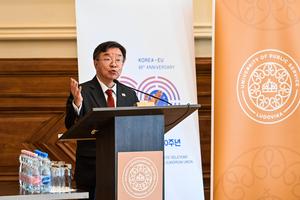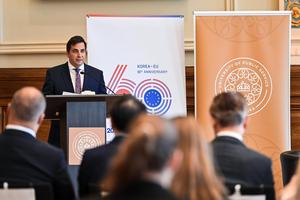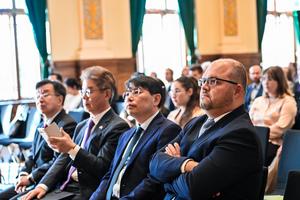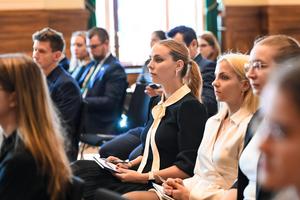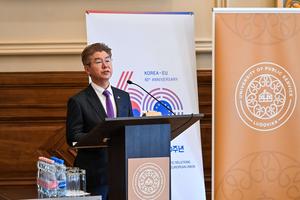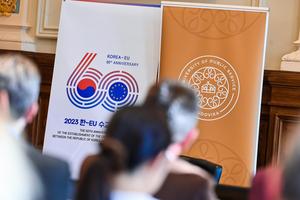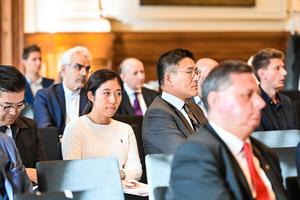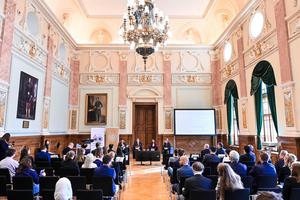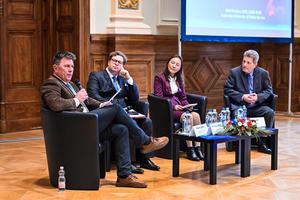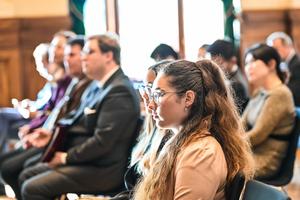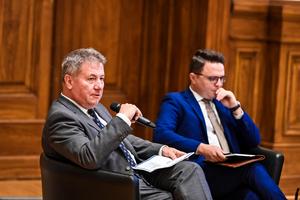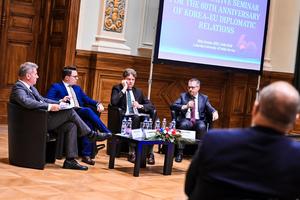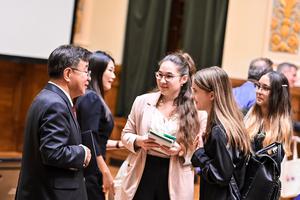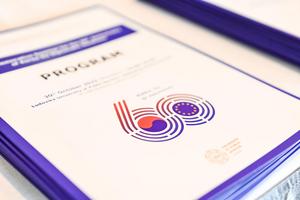On the occasion of the event, the accredited embassies of the Republic of Korea to the Kingdom of Belgium and the European Union, along with the EU's Permanent Representation to NATO, organised a seminar in collaboration with the Ludovika University of Public Service and the Embassy of the Republic of Korea in Budapest. The aim of the event was to provide a platform for reviewing the diplomatic relations of the past sixty years and discussing planned steps to strengthen future partnerships further. Additionally, opportunities were provided to make policy proposals related to Hungary's upcoming EU presidency next year.
At the event organised by the International Directorate of the university, Gergely Deli, the Rector of LUPS, greeted the attendees. "Our countries maintain excellent political relations, and our university aims to contribute to this by developing and strengthening our scientific relations with Korean institutions," he stated. To achieve this, LUPS signed a long-term cooperation agreement with the National Defense University of Korea, which is renewed every five years. The university used to have a similar cooperation agreement with the Korean Institute of Public Administration, which will be renewed soon. Additionally, there is an upcoming professional trip being organised to Korea, aiming to establish connections with universities and scientific institutions there. "We consider the Republic of Korea as a good example, especially in the fields of robotics and cybernetics," he said.
In his speech, Kyudok Hong, the Ambassador of the Republic of Korea to Hungary, first congratulated the Hungarian Nobel laureates. He expressed his appreciation for the students of LUPS who contribute to Hungary's success as police officers, soldiers, and officials. He also thanked the renowned experts who agreed to participate in panel discussions later in the day. "Our countries share many commonalities: we are both small nations, but nations with a history of fighting for freedom. We work together in strong partnerships, respecting each other," the ambassador emphasised, referring to the activities of Korean companies and investors in Hungary and the existing trade partnership. He also mentioned their efforts to strengthen their presence within the EU and looked forward to Hungary's upcoming presidency. He also discussed the various challenges of the present time, emphasising that by working together and developing strategies collaboratively, these challenges can be overcome.
Jeonghyun Ryu, the Ambassador of the Republic of Korea to the EU, highlighted the increasingly close strategic and trade cooperation between the EU and Korea. He stated that the EU is one of the most important investors in his country. He identified digital services, green industries, and healthcare as areas for further cooperation. The ambassador emphasised that cooperation is based on close coordination and communication, grounded in shared values such as freedom and democracy. Within the EU, Hungary is one of Korea's key partners.
The opening speeches were followed by a panel discussion titled "The 60-Year History and Development Directions of Korea-EU Cooperation," moderated by Miklós Lengyel, former Ambassador of Hungary to Seoul. As part of the discussion, Adrien Carbonnet, Director of the Center for Korean Studies at KU Leuven, presented on the background of the 60-year-old diplomatic relations between Korea and the European Economic Community (EEC) and the important milestones in this rapprochement. The presentation aimed to answer three questions: why did the relationship begin, which party initiated it, and why did the other party agree to it?
The participants first received background information on the uniformity that Europe was starting to create in 1963. The presentation covered topics such as the common market, the founding Treaty of Rome, the customs union established by six countries, and the common agricultural policy. At that time, the main institutions shaping the community's direction were the Council of Ministers and the nine-member Commission.
As contemporary documents show, Korea initiated the establishment of diplomatic relations, and the presentation detailed the diplomatic steps taken in the process. The driving force was the legitimisation of a new system. In 1961, Park Chung-hee seized power through a coup, leading to economic prosperity. Within two years, diplomatic relations were established with 50 countries, including the European Economic Community (EEC). Negotiations with the EU began at this time, aiming to strengthen both trade and political relations. The EEC member states approved the connection for similar reasons: they wanted to strengthen trade ties with Asia and already had active collaborations with South Korea.
The roundtable discussion that followed highlighted how much progress the extremely poor Asian country made to become one of the EU's most important partners. The experts also recalled that Hungary was the first among the Central and Eastern European countries to establish diplomatic relations with Seoul after the regime change. The relationship between the Asian country and the EU started to develop dynamically after the entry into force of the Maastricht Treaty in 1993. Economic cooperations now extend to political and security areas.
The second panel discussion was moderated by Gergely Prőhle, Director of the Institute for Strategic Studies at LUPS, focusing on the topics related to Hungary's upcoming EU presidency.
Text: Lilla Kovács
Photo: Dénes Szilágyi
